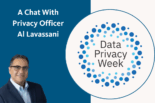By Jeannie Louie and Ana Buenaventura. In this era of digital transformation, UCSF meets both opportunity and risk as we evolve and adapt in how we conduct research, education, patient care, and public service. Current virtual-care trends could lead to industry changes like online referrals, AI-enabled symptom checkers, e-consultations, real-time eligibility checking, new health risk algorithms, e-visits, patient-held records, and provider credentialing and recruiting.
To address such demands, UCSF has various digital transformation projects underway with goals of increasing satisfaction of all our users, lowering cost, improving productivity, extending our patient communities, and ultimately improving health outcomes—while adapting to trends that will disrupt how we currently operate and deliver value.
In the past decade, digital transformation has changed how most organizations operate their businesses. To remain competitive in a digital world, organizations are turning to digital technologies to evolve business processes, culture, and customer experiences.Business analysts (BAs) can be crucial in helping organizations answer key questions in digital transformation like, “Can we change our processes in a way that will enable better decision-making or a better customer experience with more personalization?”
And in this era of digital transformation, the business analyst’s role also is rapidly expanding beyond requirements gathering, data analysis, and technical translation. They must be agile and enable iterative conversations as technologies quickly change.
Our School of Medicine Technology Services team (SOM Tech) partners with UCSF business leaders seeking to transform their operations using technology. The team helps them understand their customers more deeply and empathetically to come up with sustainable and robust solutions. Below are just a few projects that SOM Tech has worked on:
- Daily COVID health screener: Partnered with Occupational Health Services to quickly design and build the health screener that enabled UCSF employees to return to work safely.
- Web portal to support cancer patients: Partnered with the Patient Counts study team (Department of Epidemiology and Biostatistics) to design and build a web portal in English, Chinese, and Vietnamese to help Asian American patients with cancer get the best possible cancer care experience. This digital platform for the Diverse eCohorts project envisioned transforming UCSF through deep community partnerships into a model research institution that champions diversity, equity, and inclusion at all levels of health and well-being for the Bay Area community and beyond.
- Contract tracking tool: Partnered with the UCSF Health Procurement team to move away from paper-based processes and streamline workflows to be more responsive to customers. Procurement had worked with SOM Tech in 2018 to migrate their procurement and contracting workflows to an electronic system. When the pandemic started in 2020, the procurement team was already positioned to easily switch to remote work and continue supporting their customers without interruptions They showcased their success story with other UC Health organizations that have expressed interest in learning more.
- Purple box: Facilitated workshops with a cross functional group to explore ways to improve the researcher user experience when requesting access to strategic enterprise data resources such as UCSF and ZSFG clinical data. These sessions resulted in a roadmap and vision for what the researcher experience could look like at UCSF and launched the first project on this roadmap named Purple Box, which re-designed the Data Access for Research form in ServiceNow, and re-architected the back-end processes, benefiting both the data requesters and the administrative staff supporting the requests.
More than ever our BAs are shifting from asking “What is a viable solution?” and reframing the question to “How can we successfully help our customers adapt in the short, medium, and long term?” Solutions are focused on improving the customer experience in addition to implementing a technology.
SOM Tech collaborates on such deliverables as:
- Business requirements to uncover business and system requirements and user needs, and validating those requirements against needs that translate into user scenarios and stories
- Clear roadmaps to meet digital transformation vision and goals
- Understanding current and future business workflows to ensure solutions align with organization processes
- User research and user interface design to create solutions to delight the customers
- Competitive analysis to find the right solution for the organization
- End-user acceptance testing to get feedback from users before rollout
- Training materials to ensure successful rollout
- Change management plan to transition from the old to new
- Success metrics tracking to ensure transformation is in the right direction
These deliverables are done iteratively as the project moves from idea to development, user testing, and implementation. Most importantly, our BAs work closely with stakeholders and collaborate with UX designers, solution architects, and other specialists for different deliverables and for different phases of the project.
BAs have progressed beyond tactical problem solvers to understanding customer behaviors and being able to facilitate conversations to help teams strive to (1) design products and solutions that delight people, (2) cultivate a culture that embraces change, and (3) respond with speed and agility—three key characteristics that nearly all successful digital transformation projects share.
Visit SOM Tech’s website for more information about our team’s work.









